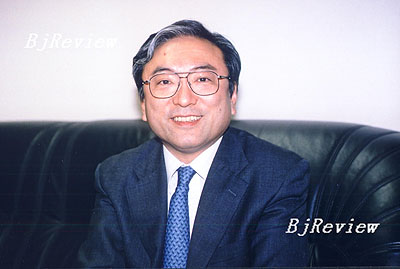
China and Japan can cooperate on a wide scope of issues, such as the organization of the Beijing Olympic Games next year and aid to Africa, said Ide Keiji, Minister of Public Relations, Press, Culture, Education and Sports and Spokesperson of the Embassy of Japan in China. He sat down with Beijing Review reporter Ding Zhitao and intern Wang Hairong to discuss his views on relations between the two countries just prior to Chinese Premier Wen Jiabao's visit to Japan.
Beijing Review: Both China and Japan are confident that Premier Wen's visit to Japan will be successful. The premier once expressed his wish to make his April visit an "ice-melting" one. What preparations has Japan made to pave the way for the Chinese premier's visit? What do you expect his visit to achieve?
Ide Keiji: As you know, last October our prime minister, Mr. [Shinzo] Abe, visited Beijing. It was his first foreign visit after he assumed the post of prime minister. I think this means that Mr. Abe puts high priority on improving relations with China. So now, the Japanese Government and Japanese people are very happy to have Mr. Wen's visit to Japan. We have already extended an invitation to Chinese President Hu Jintao, and we also expect his visit to Japan. Also, we expect such mutual visits by leaders and high-ranking individuals of the two countries to increase this year and next year.
Next year the Beijing Olympic Games will be held. These Olympic Games are not only Olympic Games for China, but also for the people in Asia and in the world as a whole. The Japanese Government and Japanese people wish to contribute to the successful organization of the Games.
We have very good prospects for the future. This is the general tendency. Premier Wen's visit is very important. We wish to promote a good atmosphere between the two countries. We expect it will provide an impetus to move each issue forward, for example, cooperation on the environment or in cultural exchanges. We are preparing concrete programs to move our relations forward. This is our overall view.
Last October, Prime Minister Abe visited China. Thereafter, leaders from both sides met on several occasions. This year more frequent high-level visits will be conducted. How will these high-level visits promote bilateral ties?
The Japanese Government's position on that point is basically the same as in the past. We always work on exchanges on different levels, including the summit level, the ministerial level and among ordinary people, and in every field: politicians, business people and cultural people. This is our policy. Summit meetings and exchanges by leaders are of course very important. They give a good signal to the peoples of the two countries. The leaders are very active and very energetic in moving our relations forward. I think this is also very important.
Recently, Premier Wen mentioned establishing "strategic Chinese-Japanese relations of mutual benefit." Earlier, Prime Minister Abe also proposed developing "strategic, mutually beneficial" ties with China. How do you understand the two terms?
| 